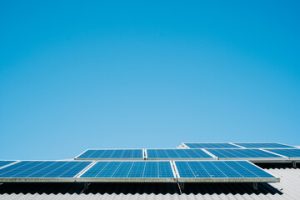In recent years, solar energy has become one of the most attractive and accessible forms of renewable energy for both residential and commercial properties. As environmental concerns rise and energy costs fluctuate, homeowners and business operators alike are turning to solar power as a reliable, cost-effective, and sustainable alternative.
Solar energy harnesses power from the sun using photovoltaic (PV) panels or solar thermal systems. This clean energy source can significantly reduce dependence on fossil fuels and traditional electricity, providing both environmental and economic advantages. Whether installed on a rooftop, integrated into new construction, or used as part of a larger energy system, solar energy offers long-term value to those who adopt it.

Below are the major benefits of using solar energy for homes and businesses.
Significant Cost Savings
One of the most compelling reasons to switch to solar energy is the potential for reduced electricity bills. Once installed, solar panels generate power from sunlight at no additional cost. This can dramatically decrease monthly utility expenses for both households and commercial operations.
For homes, this means more predictable energy bills and the ability to offset rising electricity rates. For businesses—especially those with high energy consumption—solar can lead to substantial savings over time, improving profit margins and freeing up capital for other investments.
Energy Independence
By generating their power, homeowners and businesses become less reliant on the grid and vulnerable to external price spikes or outages. This energy independence is especially valuable during peak usage times or in areas prone to power interruptions.
Solar systems can be paired with battery storage to ensure backup power during emergencies or nighttime use. This added layer of security contributes to greater peace of mind and operational stability, particularly for critical facilities or remote locations.
Environmental Sustainability
Solar energy is a clean, renewable source that produces no emissions during operation. Unlike fossil fuels, which contribute to air pollution and greenhouse gas emissions, solar helps reduce a property’s carbon footprint and environmental impact.
For environmentally conscious individuals and organizations, adopting solar energy is a meaningful step toward sustainability. It supports broader efforts to combat climate change and aligns with eco-friendly initiatives and values. Over time, even small-scale solar installations can make a measurable difference in reducing global emissions.
Increase in Property Value
Homes and commercial buildings equipped with solar energy systems often see a rise in market value. Buyers are increasingly interested in energy-efficient properties that offer long-term savings and environmental benefits.
For residential real estate, solar panels are viewed as upgrades, similar to renovated kitchens or modernized HVAC systems. For businesses, solar installations can enhance a company’s image and appeal to eco-conscious consumers, investors, and partners.
Low Maintenance and Long Lifespan
Solar energy systems are known for their durability and minimal maintenance needs. Once installed, they require little ongoing care aside from occasional cleaning and periodic inspections to ensure peak performance.
Most modern solar panels are designed to last 25 years or more, providing a long-term return on investment. This reliability makes solar energy a practical solution for those looking to minimize maintenance headaches and maximize energy output.
Job Creation and Economic Impact
The adoption of solar energy contributes to economic development by creating jobs in manufacturing, installation, maintenance, and system design. Both residential and commercial projects help support a growing green economy.
By investing in solar, property owners not only improve their financial outlook but also contribute to job growth and innovation in the clean energy sector. This is particularly meaningful for communities seeking sustainable, future-focused industries.
Scalability and Versatility
Solar energy systems can be tailored to fit a variety of needs and property types. Whether it’s a single-family home, an apartment complex, a retail shop, or a large industrial facility, solar solutions can be scaled accordingly.
This flexibility makes solar viable for a wide range of users—from small households looking to reduce their utility bills to corporations pursuing long-term energy strategies. Systems can be installed on rooftops, ground mounts, carports, or integrated into building designs.
Supports Broader Energy Goals
Switching to solar energy not only benefits individual users but also supports larger national and global goals related to clean energy adoption and energy security. As more homes and businesses produce their power, the overall demand on the grid is reduced. This can help stabilize electricity prices and lessen the need for infrastructure expansion.
Widespread solar adoption contributes to a more resilient and diversified energy landscape, which is crucial in times of high demand or crisis.
Eligibility for Incentives and Support Programs
Many regions offer financial incentives for adopting solar energy, including tax credits, rebates, grants, and net metering programs. These incentives can significantly reduce upfront installation costs and shorten the payback period.
While the availability of these programs varies, they often make solar more accessible and appealing for both homeowners and business operators. Exploring these opportunities can unlock additional savings and boost the overall return on investment.
Solar energy offers a compelling combination of financial, environmental, and practical benefits for both residential and commercial users. From lowering electricity costs and increasing property value to promoting sustainability and energy independence, solar is a forward-thinking choice with long-term rewards.
As technology continues to improve and costs decline, solar energy becomes an even more attractive option for those seeking clean, reliable power. Whether you’re a homeowner looking to reduce monthly expenses or a business aiming to improve operational efficiency, solar energy is a smart investment in the future.